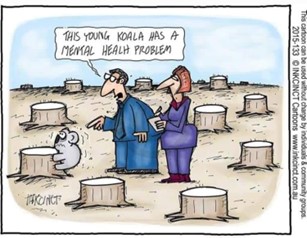APS College of Community Psychologists

Welcome to the APS College of Community Psychologists!
What do Community Psychologists do?

If you ever feel overwhelmed by the enormity of modern struggles, such as climate change, violence and discrimination, you may be interested in becoming or working with a community psychologist. Community psychologists help individuals, groups and communities tackle disempowering social conditions and create healthier living environments that promote wellbeing. We focus on the forest as well as the koala.
Community psychology provides opportunities for psychologists to work beyond the health system to improve Australians’ mental health. Community psychologists leverage social, cultural, political and environmental systems to address critical social determinants of mental health and wellbeing, such as violence, poverty, discrimination, isolation, exclusion, job and housing insecurity.
Community psychologists can work as therapists, but they also contribute to large scale social change by connecting the best of psychology with the work of partners in allied fields such as social work, community development, public health, youth work, sociology, social epidemiology, social justice, prevention, urban studies, place-making and activism. Community psychologists also specialise in working with community members to harness their expertise, local knowledge, hopes and resources to build programs that aim to transform conditions that contribute to disadvantage, oppression or marginalisation.
Community psychologists’ skills in community engagement, consultation, empowerment, ecological systems assessment, complex project management, working with diversity, advocacy, strategy/policy design, action-oriented research and evaluation help them implement multi-layered interventions across systems and structures that improve communities’ quality of life.
While other areas of psychology may focus on chemical imbalances, community psychologists primarily focus on the impact that power imbalances have on mental health and wellbeing. Community psychologists play a critical role in supporting therapeutic work by contributing to healthier environments for clients to recover in (e.g., less stigma and discrimination) and new opportunities for them to improve their lives (e.g., more social networks and meaningful activities).
Community psychology also has a sharp intellectual, activist edge that focuses on bringing sensitive ethical issues such as decolonisation and human rights to life. Community psychologists draw on critical psychology to constantly challenge our members to reflect on their practice.
Community psychologists often build very rewarding careers in workplaces, such as
- community-based not-for-profit organisations (e.g., multicultural, human rights, family violence, homelessness, sexual assault, alcohol and drugs, disability)
- federal, state and local government,
- community health services, public health services, hospitals and clinics,
- universities, education and research institutions,
- consultancy firms and private practice.

What does the APS College of Community Psychologists do?
The APS College of Community Psychology promotes the value of community psychology to the broader Australian community and supports community psychologists to continuously improve their professional skills and networks.
Community psychology is growing across Australia. We are a close and collaborative community who offer a great chance for professional development, connection with peers, and long-term friendship. We always welcome new members, friends, and allies. Please browse this College site and contact us if you need further information.
Objectives
The objectives of the College are to:
- Encourage the development of theory, research and practice relevant to understanding and supporting people in the contexts of their social systems and settings
- Maintain practice standards and quality assurance in the field of community psychology
- Adhere to community psychology principles of equity and respect for diversity across theoretical models to meet the needs of different people
- Encourage and support the education and continuing professional development of community psychology
- Serve as a medium for exploration and discussion of issues relevant to research and practice within the field of community psychology
- Work collaboratively with other associations, organisations or community groups with similar interests
You can engage with community psychologists, students of community psychology and discover our latest news by following us on our socials.



